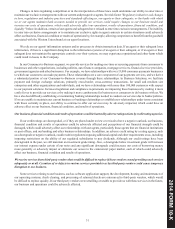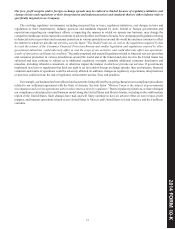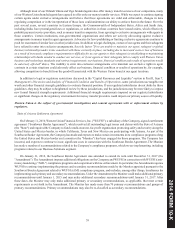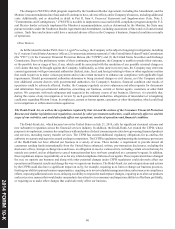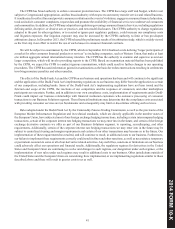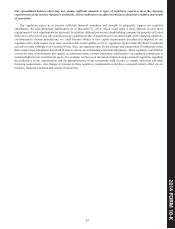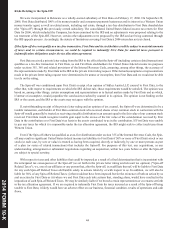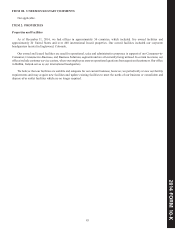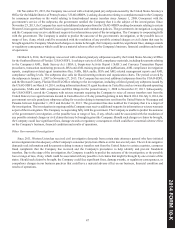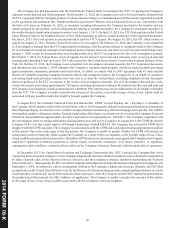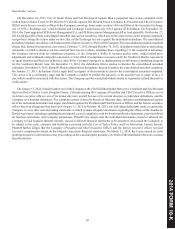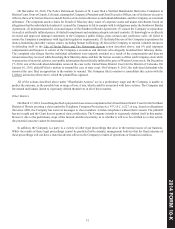Western Union 2014 Annual Report Download - page 179
Download and view the complete annual report
Please find page 179 of the 2014 Western Union annual report below. You can navigate through the pages in the report by either clicking on the pages listed below, or by using the keyword search tool below to find specific information within the annual report.
2014 FORM 10-K
41
The CFPB has broad authority to enforce consumer protection laws. The CFPB has a large staff and budget, which is not
subject to Congressional appropriation, and has broad authority with respect to our money transfer service and related business.
It is authorized to collect fines and provide consumer restitution in the event of violations, engage in consumer financial education,
track and solicit consumer complaints, request data and promote the availability of financial services to underserved consumers
and communities. In addition, the CFPB may adopt other regulations governing consumer financial services, including regulations
defining unfair, deceptive, or abusive acts or practices, and new model disclosures. The CFPB's authority to change regulations
adopted in the past by other regulators, or to rescind or ignore past regulatory guidance, could increase our compliance costs
and litigation exposure. Our litigation exposure may also be increased by the CFPB's authority to limit or ban pre-dispute
arbitration clauses. In December 2013, the CFPB released the preliminary results of its arbitration study, which is widely viewed
as the first step in an effort to restrict the use of such clauses in consumer financial contracts.
We will be subject to examination by the CFPB, which in September 2014 finalized a rule defining "larger participants of
a market for other consumer financial products or services" as including companies, such as Western Union, that make at least
one million aggregate annual international money transfers. The CFPB has the authority to examine and supervise us and our
larger competitors, which will involve providing reports to the CFPB. Based on examination material that has been published
by the CFPB, we expect the CFPB to conduct rigorous examinations, which could result in further changes to our operating
procedures. The CFPB has used information gained in examinations as the basis for enforcement actions resulting in settlements
involving monetary penalties and other remedies.
The effect of the Dodd-Frank Act and the CFPB on our business and operations has been and will continue to be significant
and the application of the Dodd-Frank Act's implementing regulations to our business may differ from the application to certain
of our competitors, including banks. Some of the Dodd-Frank Act's implementing regulations have not been issued and the
function and scope of the CFPB, the reactions of our competitors and the responses of consumers and other marketplace
participants are uncertain. Further, and in addition to our own compliance costs, implementation of requirements under Dodd-
Frank could impact our business relationships with financial institution customers who outsource processing of consumer
transactions to our Business Solutions segment. These financial institutions may determine that the compliance costs associated
with providing consumer services are too burdensome and consequently may limit or discontinue offering such services.
Rules adopted under the Dodd-Frank Act by the Commodity Futures Trading Commission, as well as the provisions of the
European Market Infrastructure Regulation and its technical standards, which are directly applicable in the member states of
the European Union, have subjected most of our foreign exchange hedging transactions, including certain intercompany hedging
transactions, certain of the corporate interest rate hedging transactions we may enter into in the future, and certain of the foreign
exchange derivative contracts we offer as part of our Business Solutions segment, to reporting, recordkeeping, and other
requirements. Additionally, certain of the corporate interest rate hedging transactions we may enter into in the future may be
subject to centralized clearing and margin requirements and certain of our other transactions may become so in the future. Our
implementation of these requirements has resulted, and will continue to result, in additional costs to our business. Furthermore,
our failure to implement these requirements correctly could result in fines and other sanctions, as well as necessitate a temporary
or permanent cessation to some or all of our derivative related activities. Any such fines, sanctions or limitations on our business
could adversely affect our operations and financial results. Additionally, the regulatory regimes for derivatives in the United
States and European Union are continuing to evolve and changes to such regimes, our designation under such regimes, or the
implementation of new rules under such regimes may result in additional costs to our business. Other jurisdictions outside of
the United States and the European Union are considering, have implemented, or are implementing regulations similar to those
described above and these will result in greater costs to us as well.


